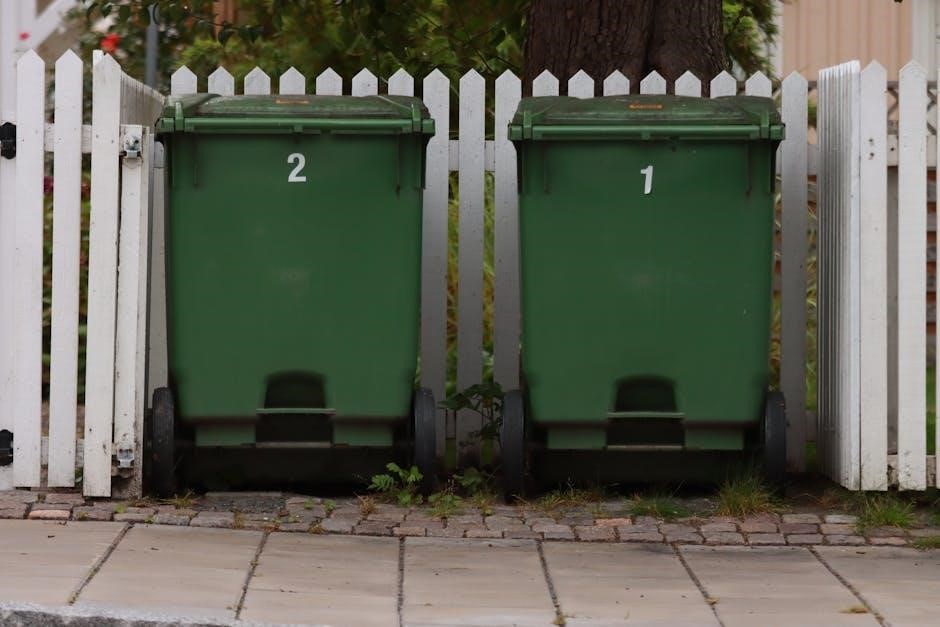Hennepin County’s Recycling Guide provides essential information on sustainable waste management, helping residents and businesses reduce waste effectively․ It outlines programs, accepted materials, and local resources to promote eco-friendly practices countywide․
Overview of Recycling Programs in Hennepin County
Hennepin County offers comprehensive recycling programs tailored for residents and businesses, promoting sustainable waste management․ The county provides drop-off locations and curbside collection services for various materials․ Special collection events are organized for hazardous waste, electronics, and organics․ Educational resources and workshops are available to guide proper recycling practices․ Partnerships with local cities ensure accessible facilities and consistent guidelines․ These initiatives aim to reduce landfill use and promote environmental stewardship, fostering a culture of sustainability across the community․
Importance of Recycling in Hennepin County
Recycling plays a vital role in preserving Hennepin County’s natural resources and reducing environmental impact․ By diverting waste from landfills, recycling helps conserve energy, decrease greenhouse gas emissions, and reduce the need for raw material extraction․ It also supports public health by minimizing pollution and promoting a cleaner community․ Recycling fosters economic benefits by creating jobs in the recycling industry and saving taxpayer dollars on waste management․ Hennepin County’s commitment to recycling reflects its dedication to sustainability and environmental stewardship for future generations․

Accepted Materials for Recycling
Hennepin County accepts paper, cardboard, glass, metal, and certain plastics for recycling․ Proper sorting ensures materials are processed efficiently, supporting environmental conservation and community sustainability goals․
Residential Recycling Guidelines
Hennepin County residents can recycle paper, cardboard, glass, metal, and plastics numbered 1-7․ Materials should be clean, sorted, and placed loose in bins․ Contaminated items, like soiled food containers, should be disposed of in trash․ Residents can check the county’s guide for specific materials and preparation tips․ Curbside pickup is available in many areas, while others use drop-off locations․ Proper recycling helps reduce landfill use and supports sustainability efforts․ For detailed guidelines, visit the Hennepin County website or contact local waste management services․
Special Items and Hazardous Waste Disposal
Hennepin County provides specific guidelines for disposing of special items and hazardous waste․ Batteries, electronics, and chemicals require special handling․ Residents can drop off these items at designated facilities or during community collection events․ Improper disposal of hazardous materials can harm the environment․ For details on acceptable items, preparation, and drop-off locations, visit the county’s website or contact local waste management services․ Proper disposal ensures safety and sustainability for the community․
Organics and Food Waste Recycling
Hennepin County offers organics recycling programs to divert food waste and yard trimmings from landfills․ Residents can participate by separating organic materials like fruit peels, vegetable scraps, and coffee grounds into designated bins․ These items are composted to create nutrient-rich soil․ Guidelines specify acceptable materials, excluding meats, dairy, and plastics․ Drop-off locations and curbside collection options are available․ Proper separation helps reduce landfill waste and lowers greenhouse gas emissions, supporting a sustainable environment for the community․

Recycling Facilities and Drop-Off Locations
Hennepin County operates multiple recycling centers and drop-off locations, providing convenient access for residents to recycle various materials responsibly․ Visit the county website for a full list․
Hennepin County Recycling Centers
Hennepin County offers several recycling centers where residents can drop off materials like paper, plastic, glass, and metal․ These centers are strategically located across the county to ensure accessibility․ Each center accepts a variety of items, including electronics, batteries, and bulk waste․ Residents are encouraged to check the county’s website for specific location details, hours of operation, and a comprehensive list of accepted materials․ Proper sorting and preparation of items are essential to ensure efficient processing and minimize contamination․ By utilizing these centers, residents contribute significantly to the county’s sustainability goals and environmental conservation efforts․
City-Specific Drop-Off Locations
Hennepin County’s 45 cities offer tailored recycling services, with many providing drop-off locations for residents․ These sites accept materials like paper, plastic, glass, and metal, often with specific guidelines․ For example, Minneapolis and Bloomington have dedicated facilities for bulk waste and electronics․ Residents should check their city’s website for location details, hours, and accepted items․ Proper sorting is crucial to ensure materials are processed correctly․ Utilizing these local resources helps communities achieve their sustainability goals and supports countywide environmental efforts effectively․
Transfer Stations and Their Roles
Transfer stations serve as critical hubs for waste management in Hennepin County․ These facilities collect and sort recyclables, organics, and trash before transporting them to processing plants or landfills․ They accept bulk items like furniture and appliances, as well as hazardous waste such as batteries and electronics․ By centralizing collection, transfer stations streamline waste handling, reduce transportation costs, and enhance recycling efficiency․ They play a vital role in maintaining the county’s recycling infrastructure and supporting environmental conservation efforts by ensuring proper disposal and processing of materials․
Community Recycling Programs and Events
Hennepin County offers various community programs and events to promote recycling and sustainability․ These initiatives include collection drives, educational workshops, and partnerships with local organizations to engage residents and businesses in eco-friendly practices, fostering a culture of environmental stewardship and resource conservation․
Community Collection Events
Hennepin County hosts regular community collection events to encourage responsible disposal of hard-to-recycle items․ These events, often held in partnership with local cities, provide opportunities for residents to drop off materials like electronic waste, batteries, and household hazardous waste․ Events are widely publicized, with schedules available on the county’s website and social media․ Residents can also access educational resources to prepare materials correctly for collection․ These events not only promote sustainability but also help divert waste from landfills, supporting the county’s environmental goals․ Participation is open to all county residents․
Educational Resources and Workshops
Hennepin County offers a variety of educational resources and workshops to educate residents on effective recycling practices․ These programs include interactive guides, webinars, and hands-on training sessions․ The county collaborates with schools, libraries, and community centers to provide accessible learning opportunities․ Workshops cover topics like proper sorting techniques, reducing waste, and understanding the recycling process․ Online tools and printable materials are also available for self-paced learning․ These resources empower residents to make informed decisions, enhancing overall recycling efficiency and contributing to Hennepin County’s sustainability goals․

Environmental Impact of Recycling in Hennepin County
Recycling in Hennepin County significantly reduces landfill use, conserves natural resources, and lowers greenhouse gas emissions, contributing to a healthier environment and sustainable future for its residents․
Reduction in Landfill Use
Recycling significantly reduces landfill use in Hennepin County by diverting thousands of tons of waste annually․ Proper disposal of materials like paper, plastics, and glass ensures they are repurposed rather than buried․ This extends the life of landfills and minimizes environmental harm․ The county’s recycling programs, including curbside collection and drop-off centers, play a crucial role in reducing waste sent to landfills․ By participating, residents help conserve space and reduce greenhouse gas emissions associated with decomposition․ Community efforts are vital to achieving these goals and creating a more sustainable future․
Conservation of Natural Resources
Recycling in Hennepin County plays a key role in conserving natural resources by reducing the need for raw material extraction․ When materials like metals, glass, and paper are recycled, it saves water, energy, and reduces pollution․ For example, recycling one ton of paper saves 17 trees and 7,000 gallons of water․ By participating in recycling programs, residents help preserve natural resources for future generations while lowering greenhouse gas emissions․ This sustainable practice supports environmental health and promotes resource efficiency countywide․
Greenhouse Gas Emission Reduction
Recycling in Hennepin County significantly contributes to reducing greenhouse gas emissions by lowering energy consumption and waste․ When materials like metal, glass, and paper are recycled, it requires less energy than producing new materials, resulting in fewer emissions․ Recycling also diverts waste from landfills, reducing methane production․ By participating in recycling programs, residents help combat climate change and improve air quality․ These efforts align with county goals to minimize environmental impact and promote sustainable practices for a healthier community and planet․

Common Recycling Mistakes to Avoid
Common recycling mistakes include contamination of recyclables with non-recyclable items and incorrect sorting of materials, which can disrupt processing and reduce efficiency․ Avoid these errors to ensure proper recycling․
Contamination of Recyclables
Contamination of recyclables is a significant issue in Hennepin County’s recycling program․ Mixing non-recyclable items, such as food waste or liquids, with recyclables can ruin entire batches․ This often occurs when residents place unclean or incorrect materials in recycling bins․ Contaminated materials are typically sent to landfills, undermining recycling efforts․ To prevent this, residents should ensure all items are clean, dry, and properly sorted․ Checking local guidelines helps avoid common mistakes, such as including plastic bags or broken glass․ Clean recyclables are essential for maintaining the effectiveness of Hennepin County’s recycling processes and achieving sustainability goals․
Incorrect Sorting of Materials
Incorrect sorting of materials is a common issue in Hennepin County’s recycling program․ Residents often mistakenly place non-recyclable items, such as plastic bags or broken glass, in recycling bins․ This misplacement can lead to entire batches of recyclables being rejected and sent to landfills․ To avoid this, it’s crucial to familiarize oneself with the county’s specific guidelines for acceptable materials․ Proper sorting ensures materials are processed correctly, maintaining the efficiency and effectiveness of the recycling system․ Correct practices help conserve resources and support Hennepin County’s environmental goals․
Future Initiatives in Recycling
Hennepin County plans to expand its recycling programs, incorporating advanced technologies and increasing public education to enhance participation and efficiency in waste management․
Expanding Recycling Programs
Hennepin County is committed to expanding its recycling programs to increase participation and improve efficiency․ Future initiatives include adding more materials to the accepted list, such as flexible plastics and textiles, while leveraging advanced sorting technologies․ The county also plans to enhance community engagement through public education campaigns and partnerships with local organizations․ By expanding drop-off locations and improving accessibility, especially in underserved areas, Hennepin County aims to make recycling more convenient and inclusive for all residents;
- Increasing recycling rates through user-friendly programs․
- Reducing landfill dependency and promoting sustainability․
- Ensuring equitable access to recycling services countywide․
Technological Advancements in Recycling
Hennepin County is embracing technological advancements to enhance recycling efficiency and accuracy․ AI-powered sorting systems are being implemented to better identify and separate materials, reducing contamination․ Additionally, the county is exploring the use of waste-tracking apps to educate residents on proper disposal methods․ These innovations aim to streamline processes, increase recycling rates, and ensure materials are processed effectively, contributing to a more sustainable future․
- AI-powered sorting systems for improved material separation․
- Waste-tracking apps to guide residents on proper recycling practices․
- Data analytics to optimize collection routes and reduce waste․
The Hennepin County Recycling Guide serves as a vital resource for promoting sustainability and community engagement through education and accessible recycling programs, fostering a greener future․
Encouraging Participation in Recycling
Encouraging participation in recycling is crucial for the success of Hennepin County’s sustainability goals․ By educating residents about the importance of recycling and providing accessible resources, the county fosters a culture of environmental responsibility․ Community events, workshops, and online tools help residents understand what materials can be recycled and how to prepare them properly․ Additionally, convenient drop-off locations and special collection events make recycling easier for everyone․ By engaging individuals and businesses, Hennepin County aims to maximize recycling rates and reduce waste, contributing to a healthier environment for future generations․
- Education and outreach programs
- Accessible recycling facilities
- Community-wide initiatives
Final Thoughts on Hennepin County Recycling
Hennepin County’s recycling efforts demonstrate a strong commitment to sustainability and environmental stewardship․ By providing comprehensive resources and fostering community involvement, the county has made significant strides in reducing waste and promoting eco-friendly practices․ The dedication to education and accessible recycling programs highlights the importance of collective action in protecting the environment․ As Hennepin County continues to innovate and expand its initiatives, it sets a positive example for other communities to follow in pursuing a greener future․

